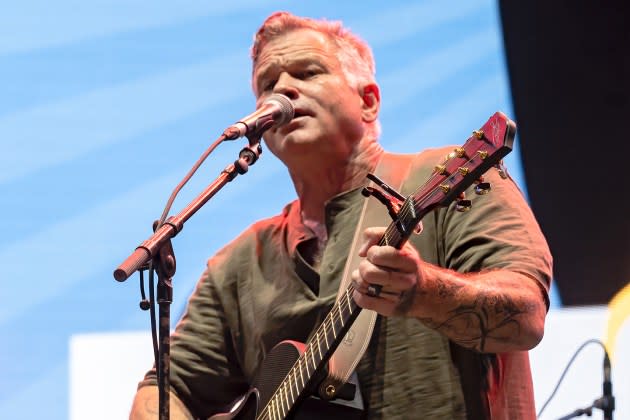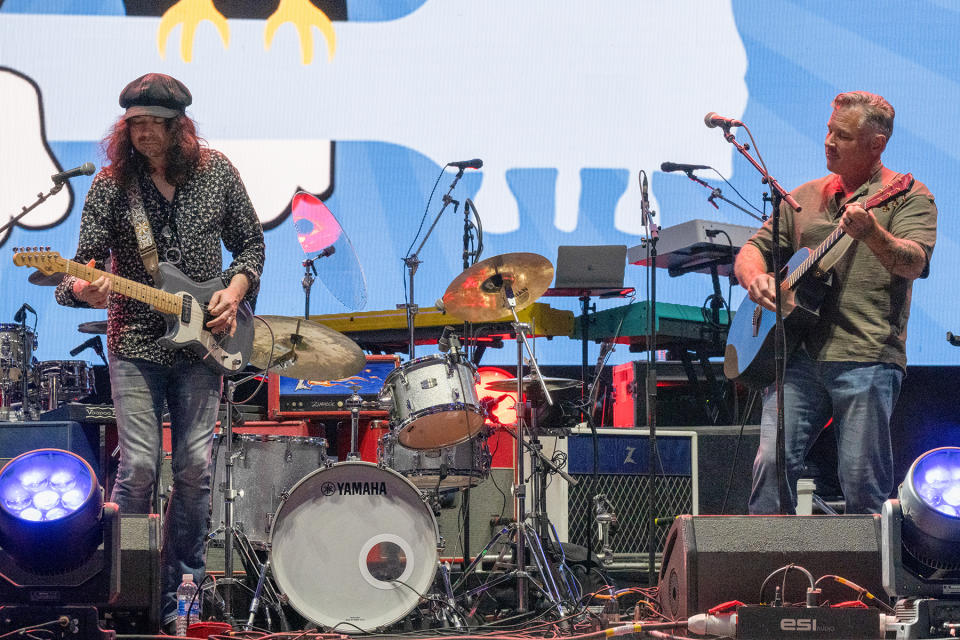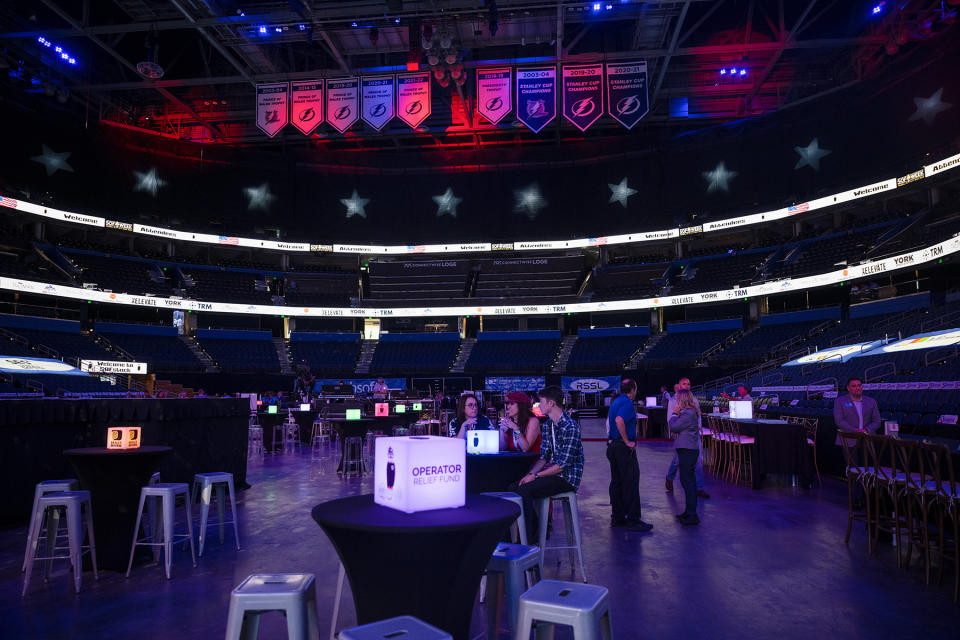Inside the Top-Secret Military Concert Series You’ve Never Heard Of
- Oops!Something went wrong.Please try again later.

It’s a Tuesday night, and I pull up to Tampa’s Amalie Arena. There’s no fanfare — no crowds lining up outside; no bright, flashing signage; nothing. My Uber driver asks if there’s an event in the area. But in just three hours, three-time Grammy-winning country superstar Brad Paisley will share the stage with a former Delta Force operator turned singer-songwriter, a former Green Beret, and a military spouse making a run at country-music glory.
But unless you were told about it, you’d have no idea a top-secret military rock concert series is about to kick off. You’d have no idea the venue is going to be filled with defense contractors, service members, and even a few generals all dressed in jeans and T-shirts. I’ve covered special operations for two decades, and I’d never heard of these events until earlier this year, when a special-operations veteran I know told me about the concerts, which feature national-headline acts performing on the same stage as bands made up of veterans. And the series has raised more than $7 million from tickets and donations for the children of fallen special-operations personnel and CIA officers.
More from Rolling Stone
The covert concerts started in 2012 in Washington, D.C. No press. No marketing. The locations and dates are closely guarded. It’s one of those things you need to hear about. Kind of like Fight Club. It started in Washington and has expanded to Tampa, Florida, home of special-operations command. The next show is in early November in the D.C. area.

The concert series is dubbed SOFstock, which gets its name from a mashup of the acronym for special-operations forces (SOF) and Woodstock. In May, a few hours before the show, I meet with Pack, the founder, to talk about the night’s show and the impact it has on the special-operations community. (He asked that his full name not be used for security reasons and, I suspect, to also keep the mystique of the event.)
Pack speaks in machine-gun bursts as he ping-pongs from our interview to concert prep to excitement over the programs he and his small team have built. Not a vet himself, Pack tells me two decades of war special operations have shouldered the brunt of the load, and this is his way to give back. He got the idea for the concert when he worked for Merrill Lynch in mergers and acquisitions of private government-contracting companies. During a tour of a defense contractor’s office, Pack noticed a jam room with instruments. The company owner told him his coders — during marathon work sessions — blew off steam by jamming. Music was a common language, a way to bond. Pack figured he could use the same idea to bring the defense community together to raise money for children of the fallen. And it sure beat the stuffy gala-circuit foundations usually used to fundraise.
The concerts started as a battle of bands made up of members of the defense community, but now the stage is headlined by professionals. The event is fueled by defense contractors who pay several hundred dollars a ticket for food, booze, and access to special-operations and intelligence-community leaders. The guest list is a closely guarded secret, but Pack confirms it was well-attended by Special Operations Command staff, the Tampa-based headquarters that oversees the SEALs and Green Berets.
The concert’s beneficiaries are the children of fallen special-operators or CIA officers who have had their entire university education paid through ticket sales to the event and donations from the concerts’ auctions. About a dozen recipients took the stage in Tampa before the auction to show where every dollar is going. But with the end of the wars in Iraq and Afghanistan, the number of killed or wounded has declined, prompting Pack to shift his attention to not only helping the children of the fallen but also treating special-operations veterans nationwide who suffer from physical and mental wounds, namely “Operator Syndrome,” a combination of post-traumatic stress, traumatic brain injury (TBI), and other conditions, which often results in sleep disorders, chronic pain, depression, suicidal ideation, and cognitive deterioration.
“We have a duty to take care of their kids when they’re gone,” Pack says. “We have a duty to help them transition out.”
While we talk, his phone chirps as emails, text messages, and calls come in looking for last-minute tickets based on word of mouth.
A high-ranking official calls asking for tickets for some of the commanders at Special Operations Command. Pack tells the man how to secure tickets, but only after he jokingly asks the generals and admirals to provide a video showing them doing 25 pushups to unlock the ticket code. Another email arrives begging for tickets for some Air Force special-operations leaders.
“These men and women that do these things in the shadow community,” Pack says, “these are the best we have.”

Plus, when Paisley takes the stage a few hours from now, he wants the arena floor full.
IT’S AN HOUR BEFORE THE SHOW, and the arena is busy as Paisley’s road crew makes final preparations on the stage and lights. The doors open around 6 p.m., and it doesn’t take long for the lobby to fill up.
Backstage, Derek — a former Delta Force operator who served more than a decade in special operations — waits. He’s minutes from taking the same stage as Paisley and his band. He’ll open the show playing songs that he wrote as a young ranger early in his military career. Now retired, this is his next mission.
“I sold all my guns and got guitars,” Derek says.
Derek has Springsteen vibes with a thick chest and biceps under a banded-collar shirt. Sitting in a dressing room, he fidgets with his hands. It’s quiet despite the crowd filling the arena less than 50 feet away. This is Derek’s first gig. His mind drifts to his old job and doing missions in Iraq. Everyone wanted to be the first man through the door during a raid, something he did with no fear, he tells me.
“I believe a thousand percent I’m going to handle whatever’s in there before they do,” he says. “Right? That’s the case onstage. I feel like I can go into that mission place. I am trying not to be scared into making mistakes out there.”
Derek retired from the military in 2017 after 20 years, including 13 years in Delta Force, the Army’s top-tier counterterrorism unit. Doctors at Walter Reed diagnosed him in 2016 with TBI. While scrolling a playlist, it dawns on him how much he uses songs to trigger memories. He bought his first rock record when he was 11 and started playing guitar soon afterward. Playing took a back seat to the war, but he returned to music and in 2020 enrolled at Berklee College of Music.
When it’s time to start, he climbs onstage and straps a guitar across his chest. A few concertgoers stop to watch. He’s the opener, and most focus on getting that first beer or finding a spot to watch Paisley.
But Derek is focused on the chords. By the time he starts to strum, the nerves are lost in the words and music. By the second song, Derek has crawled all the way inside of his set, full of lyric-forward acoustic tunes written from his experience as a soldier and as a veteran making the transition to civilian life. One standout tune — “Boxes and Bows” — written for his wife about a hard time in their marriage, gets the most applause.

Before Paisley takes the stage, there is a short auction hosted by Rob Riggle. After a few jokes, members of the crowd surround the T-shape stage and hold up paddles as auction items flash on the video screens. A professional auctioneer keeps the bids coming, raising $100,000 for a white straw cowboy hat signed by Paisley.
Then Paisley — who declined an interview request — finally takes the stage and blows through his set of greatest hits: “Mud on the Tires,” “I’m Going to Miss Her,” “Alcohol.”
Backstage after the show, Derek collects his stuff from a dressing room not far from Paisley’s. He just shared the stage with a country legend for his first gig. Derek’s new mission is to find another audience.
Meanwhile, I find Pack in the seats to the left of the stage. He is happy.
“I thought it was brilliant,” he says.
As volunteers and Paisley’s road crew pack up, Pack is already thinking about how to spend the money. He won’t disclose the amount raised — by my math he raked in about half a million, including $100,000 for the auctioned hat alone — but he knows every dollar raised is going to support either a child whose parent gave the last full measure or an operator searching for some peace after two decades of war.
This story has been updated with the correct amount of money raised by SOFStock.
Best of Rolling Stone

